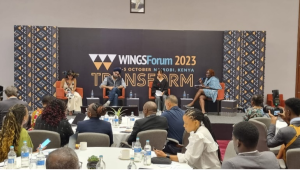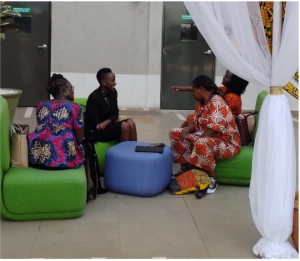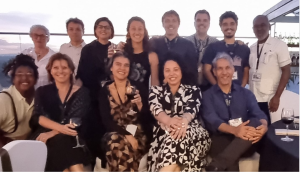The triennial meeting of WINGS – Worldwide Initiatives for Grantmaker Support took place in Nairobi, Kenya, in October. Guided by the theme TRANSFORMATION, participants from 45 countries reflected on how to unlock the potential of philanthropy. Representing IDIS, Paula Fabiani, CEO of IDIS and member of the board of WINGS, and myself, Luisa Lima, responsible for the communication and knowledge area, and for the first time participating in the meeting. In all, the Brazilian delegation had 15 representatives.
The opening plenary set the tone for the event: ‘Existential Challenges and Shared Futures: Rediscovering the Role of Philanthropy’. The Brazilian indigenous activist Txai Suruí, shared the wisdom of her people – we are all nature and just protecting is not enough, we must give back everything we receive. He said that the future is ancestral – in our cultures there are many of the answers we seek that may have been lost or not valued – and the statement was quoted by many people throughout the event. The Englishman of Indian descent, Indy Joha, used numbers and data to show how we are not realizing the scale of our problems, or we don’t want to realize them, after all, each one of us is also responsible for them. Estonian philanthropist Jaan Tallinn highlighted the role of business in philanthropy and his personal journey – he is the founder of Skype, Kazaa and the Centre for Existential Risk Studies at the University of Cambridge. In his speech, a positive look at the use of artificial intelligence, which in his opinion can bring great benefits to society if there is investment. Rena Kawasaki, a young Japanese woman, said that at the age of sixteen she was invited to join the board of a biotechnology company. The experience changed his life and involving young people in decision-making about solving the challenges that will impact their future became his cause. The message was that it is possible and necessary to transform our development model and that the strength is when we do it together.
Over the course of three days, some topics stood out in the conversations and at times, the term of African origin, Ubuntu, which means ‘I am what I am, because we are all of us’, was mentioned. We are all connected, and in our philanthropic practices this understanding, this assumption, can guide everything we do. Also connected are the challenges we must face – poverty, inequalities in general, and gender and race inequalities with their specificities, education, health, climate emergencies, and many others, which together configure the polycrisis, another very present theme. Among other highlights, the importance of leadership development and youth involvement, community foundations as a model that privileges local solutions, the importance of decolonizing philanthropy, investing in the sector’s infrastructure and institutional development, and the potential of alternative financing models such as blended finance or venture philanthropy to leverage philanthropic capital.
 In the plenary sessions, there was a debate on the role of councils, a topic on which there is relatively little reflection, even though governance is so often mentioned by organizations. The Brazilian Rodrigo Pipponzi, founder of the MOL Group, and chairman of the board of the ACP Institute, shared his vision and the importance of clarity about the role of each of the instances. In a debate with philanthropists, the Indian Vidya Shah highlighted the importance of business commitment to sustainable practices (looking inward) and the importance of investing not only in causes, but in the institutional development of organizations. The Austrian Marlene Engelhorn told of her campaign for the taxation of large fortunes, herself representing a very wealthy family. In his opinion, this is an important starting point for reducing inequalities.
In the plenary sessions, there was a debate on the role of councils, a topic on which there is relatively little reflection, even though governance is so often mentioned by organizations. The Brazilian Rodrigo Pipponzi, founder of the MOL Group, and chairman of the board of the ACP Institute, shared his vision and the importance of clarity about the role of each of the instances. In a debate with philanthropists, the Indian Vidya Shah highlighted the importance of business commitment to sustainable practices (looking inward) and the importance of investing not only in causes, but in the institutional development of organizations. The Austrian Marlene Engelhorn told of her campaign for the taxation of large fortunes, herself representing a very wealthy family. In his opinion, this is an important starting point for reducing inequalities.
Among the speakers and participants, there were many representatives from the African continent, who contributed to a better understanding of the specificities of the region. Quite dependent on international philanthropic capital, there have been debates about how they expect this support to happen, with greater independence for the creation of local solutions, and not purely the implementation of Western projects, which may be faster, but which sometimes do not involve communities, generate externalities and sometimes repeat a colonialist logic. The importance of broadening the debate and practice of trust-based philanthropy has appeared in many moments. As a Brazilian, it was particularly special, because I could see how some practices and customs are also foundational to who we are, brought hundreds of years ago by men and women who were enslaved. I was struck by how models cited by Africans resemble the models of the Black Brotherhoods, in colonial Brazil, for example.

Networking spaces at WINGSForum 2023
The multicultural, diverse environment, with people from such different backgrounds, contributed to the richness of the conversations. The spaces in the program for networking and working groups allowed the exchange of experiences on specific topics. In a session on the production and use of data, for example, we shared experiences. A participant from a human rights organization drew attention to how their data that is collected to protect populations, if not stored carefully, can be demanded in times of crisis, and be used against the populations it was intended to protect. Representatives of African countries, in turn, drew attention to the difficulty of disseminating the findings, since many governments consider only the data produced by public bodies to be official. The best use and analysis of existing data was also mentioned, as well as the importance of training organizations to understand how to read data and use it to their advantage.

Brazilian delegation at WINGSForum 2023
Transformation is the result of the action of each one of us and the feeling is that everyone came out energized and imbued with this duty. In line with the theme of the Brazilian Forum of Philanthropists and Social Investors 2023 (link to the summary article), BOLDNESS was one of the watchwords. We must be more ambitious and take risks. It is urgent to act and for that, we will catalyze the power of this and so many other networks, which bring power in their constitution. Let’s create the future we want!
Luisa Lima is the Communication and Knowledge Manager of IDIS
Credit:Source link




